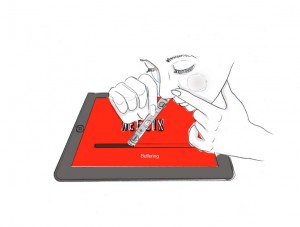We are all familiar with Netflix, and for the most part it is considered a handy tool for killing time or hosting movie nights with friends. By making the process of obtaining and viewing movies and TV shows more accessible, it is easy to abuse this powerful piece of technology. “Binge-watching”, or the process of watching numerous TV shows back to back in a single sitting, is a prominent phenomenon in today’s society. Bingeing may have its time and place, but the constant use of Netflix could have some potentially negative effects.

One of the biggest questions asked when evaluating the effect of Netflix on individuals is how it influences mental health, specifically anxiety and depression. There have not been many intensive studies into the health effects of binging Netflix as it is still a relatively new invention. Many people have reported, though, that the process of watching an inordinate amount of Netflix can be draining and can cause feelings of sadness and depression once a TV show ends (The Guardian). There is a feeling of attachment that comes with watching a show constantly, and individual’s moods are affected when there are changes in the show, or the show ends. But this depression can extend beyond the fleeting feelings associated with the end of a show. Those who watch a large amount of television, or in this case Netflix, have a higher rate of loneliness that comes with the isolation that occurs from prolonged TV watching. This loneliness can trigger depression, which already affects a large amount of the United States population.
 Besides the assumed effect on mental health, there are other health risks posed by binge watching Netflix. This has less to do with the act of watching TV, but more so on the health issues associated with sedentary tendencies. According Reader’s Digest, by sitting for a prolonged amount of time, an individual is at a greater risk for issues like obesity, heart attack and diabetes later in life. These issues are very prominent in the United State as it is. Many people who binge are unaware of the long term effects as they only focus on the initial gratification that comes with enjoying a couple episodes of your favorite show.
Besides the assumed effect on mental health, there are other health risks posed by binge watching Netflix. This has less to do with the act of watching TV, but more so on the health issues associated with sedentary tendencies. According Reader’s Digest, by sitting for a prolonged amount of time, an individual is at a greater risk for issues like obesity, heart attack and diabetes later in life. These issues are very prominent in the United State as it is. Many people who binge are unaware of the long term effects as they only focus on the initial gratification that comes with enjoying a couple episodes of your favorite show.
The binging of TV has been around as long as the invention of television, but by adding the digital age into the equation, Netflix makes it easier to feed this addiction. Addiction is a common topic of discussion on college campuses, but people mainly consider drugs and alcohol as objects of discussion. Binge-watching Netflix might be just as detrimental to a college career, though. Not only could students begin to prioritize their leisure activities, such as Netflix, over their academic studies, the act of watching Netflix late into the night greatly cuts down on the hours of sleep that students receive (Network 58). Young adults should ideally average around 9 hours of sleep per night. This is already limited by everyday obligations such as school, work, and a social life. Through the addition of a fourth variable, one that takes a significant amount of time away from other activities, the schedule of the student is stretched too thin. There are many students who, when choosing which activities to cut back on, even prioritize their binging tendencies.
I love Netflix. In fact, it is one of my top recommended websites. But regardless, the act of binge-watching Netflix should be treated as an addiction and should not be joked about in such light tones. By not exercising control, the effects of binge watching can extend into all aspects of life, not only academic and social pursuits, but in terms of health as well. College is a stressful time as it is and there is no need to add to the headache and potential quarter-life crises that come with the early 20s by indulging in the easily preventable risk that is binge-watching TV. Netflix is great in many situations, but it is always wise to exercise some caution when indulging in this addictive instrument of leisure.
References:
https://www.theguardian.com/commentisfree/2016/mar/04/binge-watching-mental-health-effects-research
http://www.rd.com/culture/binge-watching-unhealthy/
http://www.network58online.com/2015/04/24/netflix-binge-watching-negatively-affecting-students/

Very well written article! Absolutely love Netflix. It is definitely my guilty pleasure and what I turn to once I have some extra time. It’s understandable that binge watching Netflix can create depressed feelings once a certain show has ended. When I finished Lost, I felt so sad that I actually cried for a hot bit. That definitely was more related to the ending of the show rather than me feeling anxious that it was over because at that point, the show needed to end. BUT, with Parks & Recreation I had such a different reaction. I was very happy about the ending of the show and then became overwhelmed with feelings of detachment because the people that had been “there” for me, were no longer. Those commercials that Amazon Fire have been producing about “Showhole” are accurate representations. I know everyone binge watches Netflix but I didn’t know that the company actually promotes that kind of behavior.
http://www.businessinsider.com/netflix-refuses-to-release-a-weekly-show-for-these-reasons-2016-1
I agree with this post 100%. For the past 2 years I have been preaching about how I don’t believe in Netflix. My 2 roommates used to spend all day watching shows, so I got annoyed with it. I agree with your point on how it should be treated like an addiction. It is so easy to keep watching shows because of that button that pops up. After you watch a show they only give you like 15 seconds to exit our or watch the next show! Its horrible.
But now thinking, could there be other 3rd variables in this situation. Do you think some kids could already be depressed, and maybe they watch it to escape from their reality for a little bit?
I like that you embedded news articles into your blog post. I wish I knew how to do that. I can completely relate to you that binging on Netflix TV shows can be dangerous. So dangerous that in fact I do not allow myself to watch shows on Netflix anymore. At my peak (low point) I was probably watching at least eight hours a day watching shows on the website. I am not a scientist or a doctor, but I know that eight hours of TV per day is not healthy. You really brought in a lot of great information into your post and utilized it effectively throughout. You are right that binge watching is nothing to joke about. People can get really sucked into their TV shows. It’s like watching one never-ending movie. When I finish TV shows I feel guilty and actually sort of depressed. I think about how much time I wasted doing nothing. We I like to spend every moment of my life enjoying my surroundings and the things I do with the people that I like. Watching too much TV is pointless in my opinion. It’s great in the moment but not great once it’s over. It truly is an addiction.Here is an article by the Wall Street Journal that helps people overcome binge-watching addictions. http://www.wsj.com/articles/how-to-overcome-a-binge-watching-addiction-1411748602
I definitely agree with your post . Netflix binging should be treated more seriously, as it is a real problem for many people. While I mostly watch shows in moderation, there have definitely been times where I waste an entire day hanging out on my couch and seeing what Meredith Grey has been up to. I can see how people who are predisposed to addictions could get sucked into watching nonstop. Here’s an article that furthers the arguments included in your post and also mentions things like how finishing an episode or season of a show taps into the reward center of our brains.
I thought this was an important blog, especially for our age demographic because kids our age are the primary “binge watchers” of Netflix. I thought this was very interesting, and the idea of binge-watching has some interesting psychological questions. First, from personal experience it seems to me that Netflix actually psychologically promotes binge-watching. As soon as you are finished with one episode, a timer immediately starts, giving you only a few seconds to either exit out of Netflix or continue onto the next show. More often than not, in this split second decision, we chose to “just watch one more”. This makes me wonder whether this is merely coincidental, or if Netflix set this up on purpose with this psychology in mind in order to get viewers to spend more time using their service. I also thought it was very interesting from a psychological standpoint how you brought up how people can get attached to shows. This seems strange, but is completely relatable. Everyone has a favorite show that they love, but I never considered that we could actually have a psychological attachment to a show. Overall, I thought this was a very thought provoking blog post, especially due to the relevance and astronomical popularity of Netflix.
Watching Netflix has become a staple in many college students daily routines and I like many others am an avid binge watcher. To have the ability to watch season after season without ads at the tip of your fingers is truly amazing, but with all great things it must be taken in moderation. One night last year I stayed up until 3:00 am the night before a big exam because I could not stop myself from pressing next episode. As some of you may guess my grade reflected my poor night sleep. I can completely understand how one can get so caught up with watching you favorite show that you seem to forget responsibilities. While escapism can be great for a momentary break from reality, having this false sense of nothing to care or worry about can be detrimental if not watched carefully. For those that struggle with the pull of the screen much like I do, go to this link below to learn about some helpful tips to break your Netflix addiction. http://lifehacker.com/how-to-break-your-netflix-binge-watching-habit-1745394858